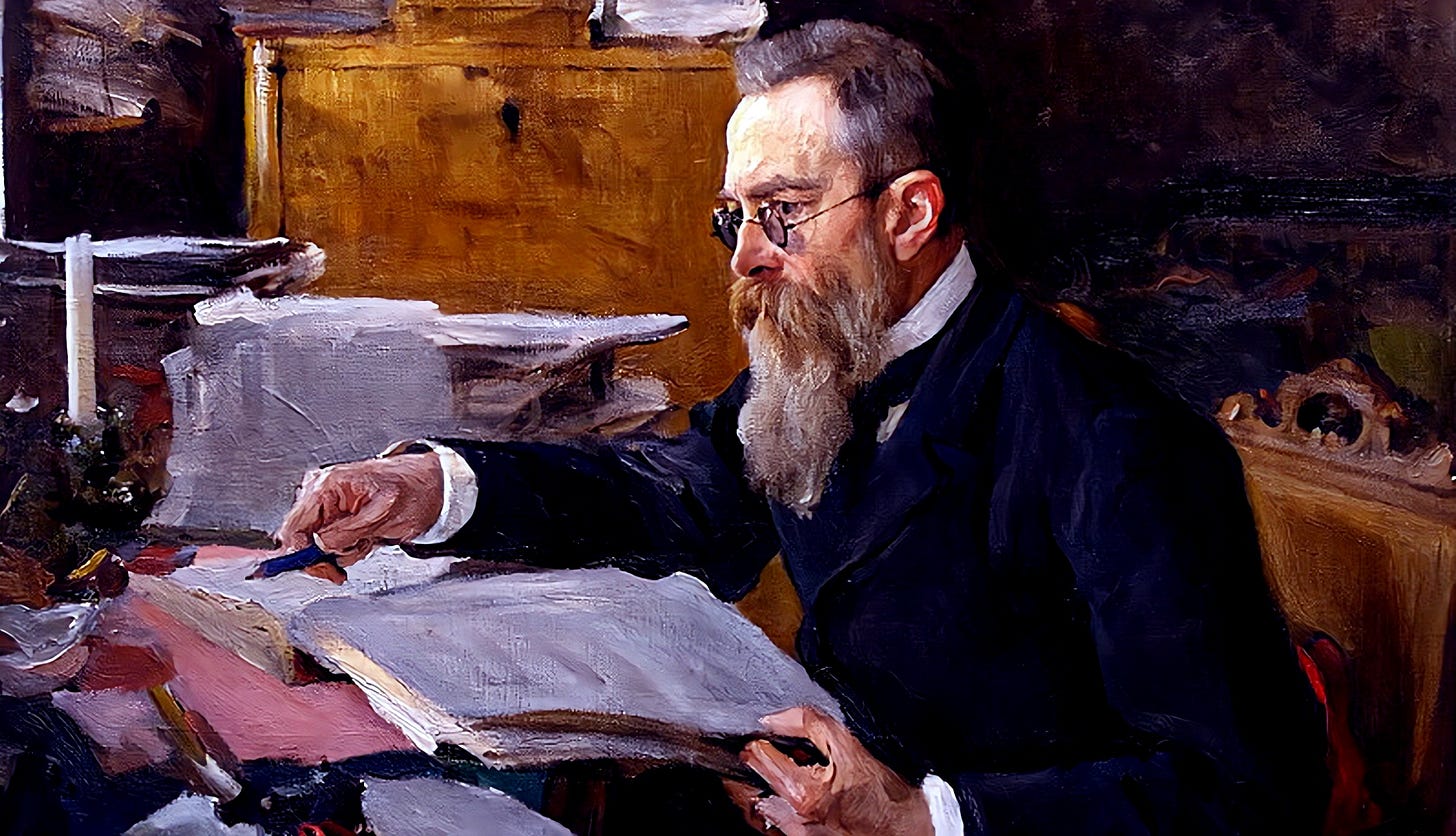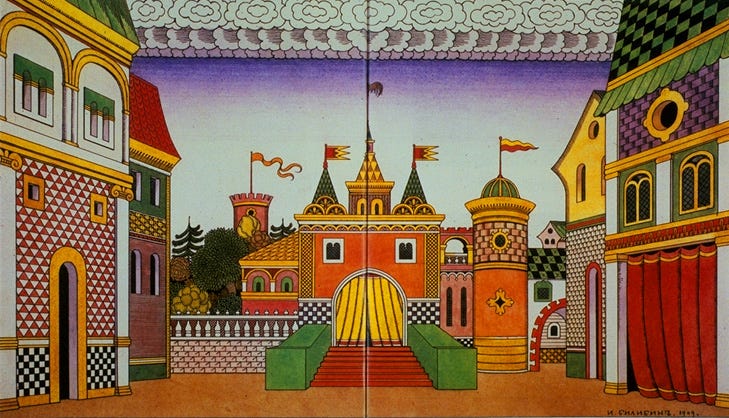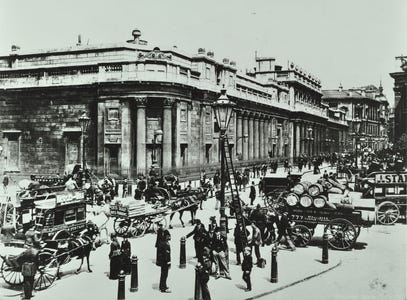There are several Russian composers whose musical fame is as notorious as their tangles with their government. Dmitri Shostakovich is the first one that springs to mind, but there are many other examples of artists who fell under the watchful eye of the state at one time or another. One in particular seems a little surprising, given his status as such an influential teacher and pillar of the Russian musical establishment.
Nikolai Rimsky-Korsakov was hardly infamous during his long career. But right at the very end, the establishment he had served for so long let him down so substantially, he left his criticism out on stage for the public to enjoy.
Rimsky-Korsakov’s work as a composer ran in tandem with several government positions, including the non-musical as an officer in the Russian Navy. His reputation was one of conservatism and discipline. While his teacher Mily Balakirev was strongly against academic approaches to music, once he got a taste of teaching music theory at the St. Petersburg Conservatory, Rimsky-Korsakov was all about it.
It was such a compelling path for him that he took three years off of composing anything and hit the books, going from counterpoint to chorales - a conservatory trajectory familiar to students of classical music today.
"Thus having been undeservedly accepted at the Conservatory as a professor, I soon became one of its best and possibly its very best pupil, judging by the quantity and value of the information it gave me!" -Rimsky-Korsakov, having accepted his faculty position at age 27
Rimsky-Korsakov was well known as a straightforward teacher, with a rigorous approach to music theory and composition. It wasn’t considered terribly Russian of him to study the work of so many European composers, but his large roster of successful alumni spoke for itself. For the first two years on faculty he remained in the military. As such, he wore his naval uniform to class, - a requirement of all Russian officers when in public, since officially they were to be “always on duty.”
"I will speak, and you will listen. Then I will speak less, and you will start to work. And finally I will not speak at all, and you will work" - Rimsky-Korsakov’s “first day of class” speech
Leading the orchestra class at the conservatory meant that he had to create arrangements for the available instrumentalists - building his now legendary skills in orchestration. After his learning break he applied everything he had absorbed to his third symphony.
Rimsky-Korsakov was also a fastidious editor. Multiple works by composers like Alexander Borodin and Modest Mussorgsky were given posthumous (or during-life) polishes that saved them from obscurity.
Borodin had the distraction of his day job working as a chemist, so when he died after 18 years of working on Prince Igor, the opera was a collection of sketches that Rimsky-Korsakov parsed and assembled.
And Mussorgsky died with only a piano/vocal score for Khovanshchina completed. Rimsky-Korsakov orchestrated it for its first performance. This is a bit more controversial - Mussorgsky’s original was more dissonant. But orchestras in Russia at the time were generally conservative, and without Rimsky-Korsakov smoothing it out (so to speak), it likely would never have been performed.
And of course there’s the work of the man himself. Lush. Beautiful.
It didn’t hurt that in the meantime he had married Nadezhda Purgold, a pianist who was more classically trained than he was. She edited her husband’s work, traveled to his rehearsals, and played in salons at their home.
"Henceforth I was a musician officially and incontestably" -Nikolai Rimsky-Korsakov
It’s not as if it all sounds “pedantic,” though that’s the long standing criticism that he faced. The so-called academic approach could easily have become boring, but Rimsky-Korsakov left a catalog of exciting, audience-friendly, evocative, and - importantly given his historic time and place - very, very Russian works.
So how did the by-the-book Naval officer run so far afoul of the Russian establishment that Rimsky-Korsakov was removed from his post at the conservatory? The answer has to do with a rooster.
In 1905 he thought he had written his last opera. His health was failing, and he’d already had 14 make it to the stage. Including, of course, one of classical music’s greatest hits in. The Tale of Tsar Saltan.
But that same year the political world around Rimsky-Korsakov seemed to crumble. And the composer knew exactly who was responsible - Tsar Nicholas II.
The Russo-Japanese War had just ended in a sound defeat for Russia. A loss that could clearly be attributed to bad judgement on the part of the tsar - a boondoggle, while there were plenty of domestic issues to manage. For the military-minded Rimsky-Korskov, the Naval loss must have been particularly frustrating. Russia’s Pacific Fleet was destroyed. And then after sailing halfway around the world, the Baltic Fleet was also annihilated. It was costly in both money and lives, for a cause that didn’t have any domestic support.
Immediately after the end of the war mass protests began across the country. On January 22, 1905, thousands of peaceful protesters marched to the Winter Palace and were fired upon by the guards. The event escalated into what is now known as Russia’s Bloody Sunday, a landmark whose death and injury toll ranges wildly depending on who you ask: 100 dead? 2-300 dead (most likely)? 1,000? Either way, it led to more uprisings and mutinies - the Russian Revolution of 1905.
100 of Rimsky-Korsakov’s students in St. Petersburg participated in a demonstration right after Bloody Sunday, and were all immediately expelled from the conservatory. After defending their right to protest to a faculty committee, he too was dismissed. The man who taught Alexander Glazunov, Sergei Prokofiev, Igor Stravinsky, Anatoly Lyadov, Ottorino Respighi, and so many more. Gone so easily. 300 students and several professors walked out of the conservatory with him. Students performed his older opera Kashchey the Deathless, and followed it with another protest.
As a result, Rimsky-Korsakov’s music was temporarily banned in Russia.
Nikolai Rimsky-Korsakov could have launched his dissent with former military compatriots, or along with his students. Instead, he put it on stage, via a work by Russia’s favorite poet Alexander Pushkin.
The Golden Cockerel is about a tsar who sends his country to war for no good reason. In the opera’s case, he’s duped by a magician (unlike the family of Tsar Nicholas II… oh wait), told that a magic rooster (cockerel) would know where danger lies and be able to warn him.
The rooster does just that, twice. For each warning the tsar sends one of his sons to defend the kingdom, leading them to kill… each other. The neighboring tsarita sees her chance to take over with no more bloodshed, and enacts her plan by seducing the tsar.
Tsar Loser is positively deluded, and immediately falls for it. In the process, he forgets that he was warned of the danger posed by that very tsarita and her army. He instead decides that what the tsarita actually wants is to marry him.
To make a complex summary short, the tsar tries to make his claim, but instead he’s pecked to death by the rooster.
"Tho' a fable, I admit, moral can be drawn to fit!" - the Magician, breaking the fourth wall in The Golden Cockerel
He finished the opera in 1907, but shockingly (ok not really), the government censors saw right through the fairy tale’s allegorical nature. The work was halted before it could premiere in Russia. France, however, had no such qualms. And so it was finally staged in Paris two years later. But Rimsky-Korsakov had been suffering from heart trouble, and died before it was finally performed.
After a lifetime of playing by rules, Rimsky-Korsakov had gone out with a bite, wielding a satire. This laid the groundwork for a new style of Russian opera - leaning into the absurdity of fantastic stories. In the next generation, Sergei Prokofiev wrote a practical fever dream in The Love of Three Oranges - a fairy tale farce about a cursed prince.
And The Nose by Dmitri Shostakovich has been confusing Western audiences for a century. The story of a military officer whose nose absconds from his face, and subsequently outranks him definitely ticked off Russian bureaucrats. As you listen to this Gallop you’ll think “this is fun!” for a moment, then you’ll ask yourself, “wait… is it?” Classic Shostakovich. (beware of the piccolo when you press play)
The golden cockerel he drew
Out from his bag by magic knew
Who would attack, and when, and where,
Enabling generals to prepare. - Alexander Pushkin, The Golden Cockerel
Rimsky-Korsakov’s parting shot did what classical music does so well - it reflected its time. One of arrogant imperialism, exploitation of workers and soldiers, and blind nationalism. Rimsky-Korsakov himself may have been the very model of a Russian composer, but his eyes were wide open.
The Golden Cockerel wasn’t just a mockery of those who had let him and his country down. It was a warning, just like the two the cockerel gave the tsar - a reminder to be wary of those who silence truth, who mock wisdom, and who make a show out of their authority.
The cockerel may disappear at the end of the opera, but the idea is universal. Be it a musician, a writer, a soldier, or a physician, one will always continue to point out the direction of danger to any of us. The warning will always be be there.
Are you watching?
-Colleen
Note: He wrote one other thing in 1905. A little more direct than The Golden Cockerel. An arrangement of Dubinushka, a folk song which became the anthem of the 1905 revolution.
Second note: My mom will be disappointed if I do a whole essay on Rimsky-Korsakov and don’t include her favorite, Procession of the Nobles from Mlada. So, here’s one more.











All of these are favorites!
I’m enjoying your Substack so much - am relatively new to learning about classical music, and was hoping there would be posts just like this. I’m learning lots, many thanks ☺️